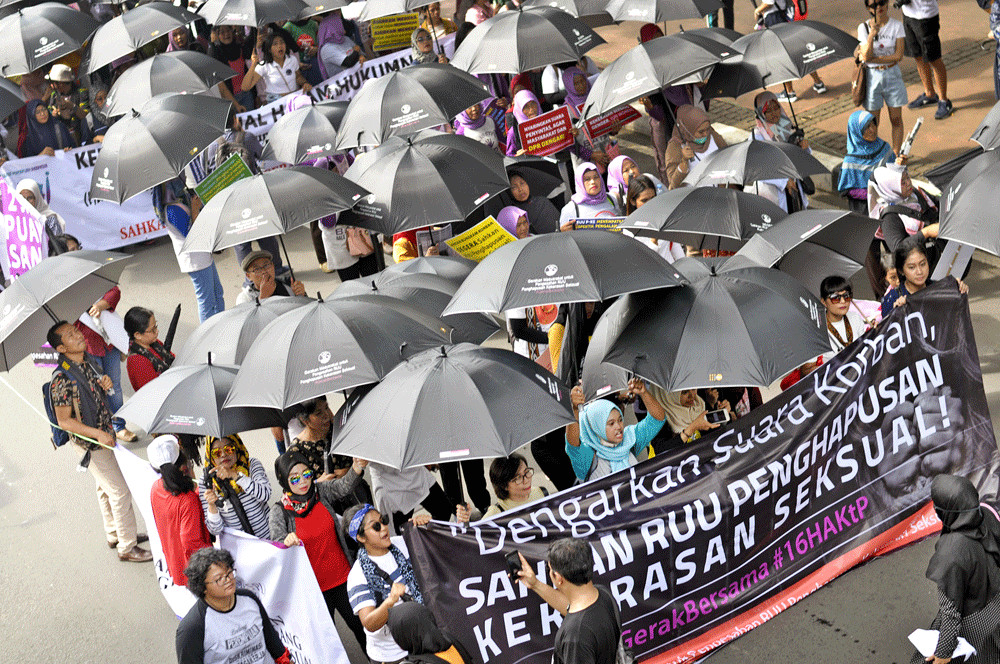Popular Reads
Top Results
Can't find what you're looking for?
View all search resultsPopular Reads
Top Results
Can't find what you're looking for?
View all search resultsHouse pressured into pledge to rush deliberation of antirape bill
The House of Representatives is to resume deliberating over a sexual violence bill this week instead of in May as initially scheduled.
Change text size
Gift Premium Articles
to Anyone
 Standing up against sexual violence: Carrying black umbrellas, activists march on Jl. MH Thamrin, Central Jakarta, on Sunday toward Aspiration Park near the Presidential Palace. The activists held a mass rally as part of this year’s global 16 Days of Activism Against Gender-based Violence campaign, during which they called on the government to immediately pass the sexual violence eradication bill into law. (The Jakarta Post/Iqbal Yuwansyah)
Standing up against sexual violence: Carrying black umbrellas, activists march on Jl. MH Thamrin, Central Jakarta, on Sunday toward Aspiration Park near the Presidential Palace. The activists held a mass rally as part of this year’s global 16 Days of Activism Against Gender-based Violence campaign, during which they called on the government to immediately pass the sexual violence eradication bill into law. (The Jakarta Post/Iqbal Yuwansyah)
T
he House of Representatives has once again pledged to expedite its deliberations over a sexual violence bill because of pressure from rights groups.
Marwan Dasopang, a deputy chairman of House Commission VIII, which is to deliberate over the bill, said the House would resume discussions this week, ahead of when it was initially scheduled to do so in May.
“We [want to] ensure that we’ll pass the bill [into law] before the new term,” Marwan said. As the legislative elections are to be held on April 17, the sitting lawmakers officially end their terms in September.
Several rights groups concerned with gender issues, along with the National Commission for Violence Against Women (Komnas Perempuan), have pushed the House to pass the bill, citing an urgency for protecting women from sexual assaults and providing a more comprehensive legal basis for how to treat sexual violence victims.
In Yogyakarta, hundreds of gender and rights activists marched last week to demand the House immediately pass the bill.
“The bill is important to protect women and children from sexual crimes,” Ika Ayu of the Yogyakarta Women’s Network said during the march.
The bill, which has been before the House since 2016, has been delayed several times because of divisions among lawmakers, particularly between conservative religion-based factions.
The bill was first proposed after the gang rape and murder of a 14-year-old girl in Bengkulu in 2016, a case that sparked public outrage because of the brutality of the attack.
However, the fate of the bill now hangs in the balance as several Islam-based political parties consider it to be pro-adultery and to support the existence of lesbians, gays, bisexuals and transgenders (LGBT). The parties claim the bill may disrupt the Islamic concept of a sakinah (happy) marriage.
Marwan, a politician from the National Awakening Party (PKB), said he lamented over what he considered to be misleading messages voiced by his fellow lawmakers, mainly from the Prosperous Justice Party (PKS).
He said several lawmakers were still confused by the definition of sexual violence and he was worried that different interpretations would arise.
The bill lists nine types of sexual violence: verbal sexual harassment, sexual exploitation, forced use of contraception, rape, forced marriage, forced abortion, forced prostitution, sexual slavery and torture using sexual abuse. It also aims to ensure victims receive restitution ranging from physical and psychological therapy to pecuniary compensation.
The leading ruling and opposition parties -- the Indonesian Democratic Party of Struggle (PDI-P) and the Gerindra Party -- are the two most outspoken factions supporting the bill.
Gerindra lawmaker Rahayu Saraswati Djojohadikusumo said that, unfortunately, not all lawmakers shared the same gender perspectives.
“When we talk about human rights, many of our [fellow] lawmakers claimed that our understanding of human rights was too westernized and that we should return to our culture. This is a pity,” said the member of House Commission VIII overseeing religious and social affairs.
“Some lawmakers are feminists while some others are allergic to [feminism]. When we talk about gender issues, they would respond with religious ideology,” Rahayu said, adding that she hoped the House would pass the bill in August.
Ali Khasan, a deputy assistant in the domestic violence division of the Women’s Empowerment and Child Protection Ministry, said the government demanded the lawmakers immediately reach conclusions regarding the bill so that the government and the House could pass it into law.
“I hope we can pass it this year. That's the commitment made by the government and the House, particularly Commission VIII. It’s urgent because the number of sexual violence cases is increasing every year, while we don’t have a rigid law that protects women’s rights,” Ali said.
Komnas Perempuan recently released annual data showing that the number of cases of violence against women reported in 2018 increased to 406,178, from the 348,446 in 2017. Like in previous years, domestic violence remains the biggest problem, accounting for 71 percent of the total figure. About 53 percent of domestic violence was committed by husbands against their wives, 21 percent by boyfriends against their girlfriends and the rest was against daughters and maids.









